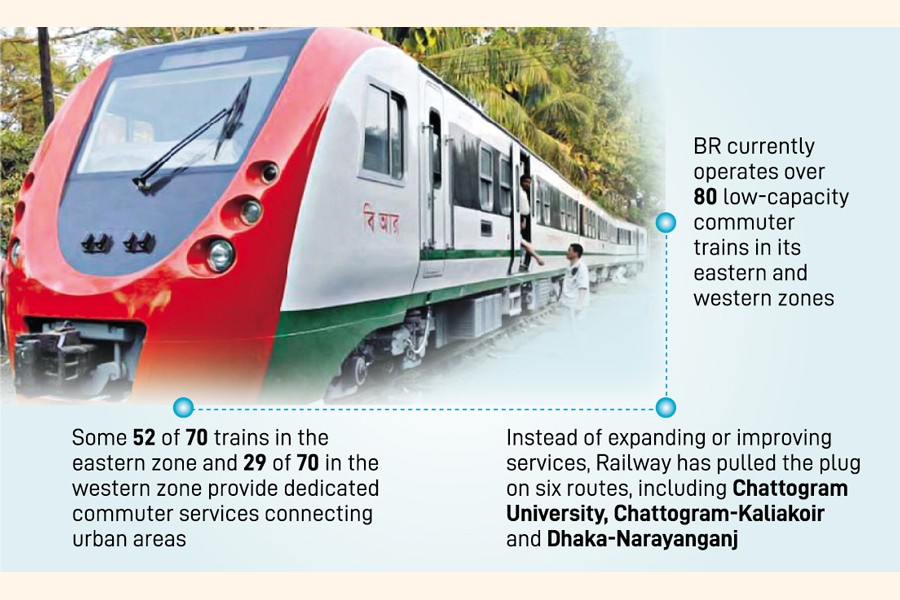
Published :
Updated :

The Bangladesh Railway (BR) is failing to keep pace with the rising demand for commuter rail services, fuelled by a rapid urbanisation boom.
This failure, mostly arising from negligence, has resulted in a decline in both the number of train services and available coaches.
Experts pointed out that while the state-owned operator had invested billions of taka since 2009, this spending largely bypassed commuter services. The only exception was the 2013 import of diesel-electric multiple unit (DEMU) trains at a cost of Tk 6.5 billion.
Globally, railways are recognised as an efficient and cost-effective urban transport solution, offering services like circular trains, mass rapid transit (MRT) and light rail transit (LRT). These options excel at connecting city peripheries with central areas at low costs.
"The railway sector is completely missing the urban development focus in Bangladesh, even though its importance is growing rapidly in developing countries," said Mohammad Hadiuzzaman, a professor of the Civil Engineering Department at the Bangladesh University of Engineering and Technology (BUET).
He cited Kolkata as an example, where over a million commuters use suburban trains daily. "Commuter trains are the beauty of a city transportation system."
The BR currently operates over 80 low-capacity commuter trains in its eastern and western zones. This shortfall originates from almost a third of its coaches being either inoperable or reassigned to intercity trains, reflecting the organisation's obsession with long-distance routes.
"At least 60 coaches have been removed from commuter services so far," a BR official told The Financial Express while speaking on condition of anonymity.
He said despite acquiring several hundred new coaches in the past decade, not a single carriage was allocated to the "second-class rail category" -- a crucial segment for many commuters.
The sight of overflowing train coaches arriving at Dhaka's Kamalapur Railway Station during morning rush hours speaks volumes about the demand for commuter services.
However, instead of expanding or improving services, the BR has pulled the plug on six routes, including Chattogram University, Chattogram-Kaliakoir and Dhaka-Narayanganj. This stoppage of the trains -- operated by the supposedly "bad investment" of Chinese DEMU units that quickly became faulty -- has left commuters high and dry.
While the BR recently relaunched the Dhaka-Narayanganj route with normal coaches, the Turag and Tangail services remain confined to greater Dhaka's fringes.
Adding to the frustration, a BR official said that despite acquiring over 750 coaches for intercity trains in the last decade, the railway traffic department never requested any for the "second-class category" commuter trains.
He says years of neglect towards pro-poor commuter services have left the BR running train services at reduced capacity.
Despite the BR witnessing a notable increase in its annual budget since 2009, with some years seeing a doubling of funds, resources have been directed towards projects like track development and gauge conversion.
New coaches have joined the intercity fleet, including those on the newly opened Padma Bridge and Dohazari-Cox's Bazar line.
Given the existing shortage, meanwhile, the BR's announcement of introducing commuter services on the Khulna-Mongla and Chattogram-Cox's Bazar lines next month raises questions about where the coaches will come from.
Frustrations boiled over recently when female commuters from Joydebpur protested BR's unannounced withdrawal of one dedicated coach from the Turag service outside the Kamalapur station manager's office.
According to BR data, some 52 of 70 trains in the eastern zone and 29 of 70 in the western zone are dedicated commuter services connecting urban areas.
Sardar Shahadat Ali, additional director general (Operations) of the Bangladesh Railway, told the FE that all these commuter trains run with a maximum of seven coaches against the demand for 10 to 12 coaches on average.
He said the second-class coaches offer minimal seating arrangements as there are no basic amenities like air conditioning, luggage space or comfortable seating.
Another BR official said the state-owned operator has limited interest in acquiring second-class coaches, claiming they're not manufactured globally and are considered less profitable than intercity coaches with similar purchase costs.
smunima@yahoo.com


 For all latest news, follow The Financial Express Google News channel.
For all latest news, follow The Financial Express Google News channel.